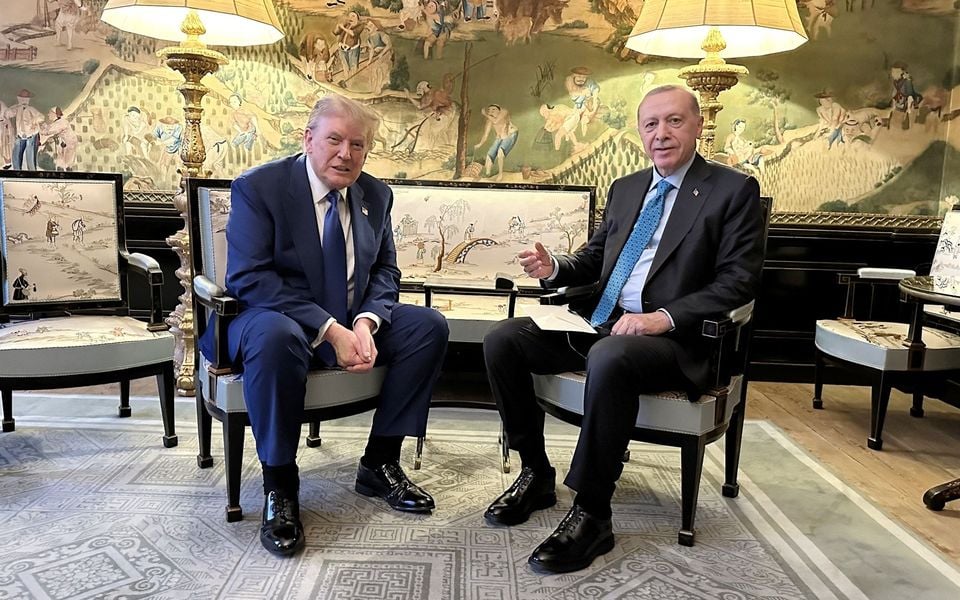
Turkey’s President Recep Tayyip Erdogan (right) meets with US President Donald Trump on the sidelines of a NATO summit in The Hague, Netherlands, on June 24, 2025. [Turkish Presidential Press Office/Handout via Reuters]
We are in a strange and contradictory phase of modern history. On the one hand, wars and conflicts are raging in many parts of the world, with some of them intensifying, due to the absence of an international deterrent mechanism and amid gaps created by the distancing policy of the United States, which are exploited by leaders with self-confidence and revisionist agendas. On the other hand, US President Donald Trump is involved personally and through his envoys in various conflicts, aiming either to deter them or to settle them, even temporarily. He thus seeks credit from the international community for his role as a peacemaker and the truth is that, in some cases, he puts a lot of pressure on the parties involved to find even the minimum common denominator.
Having so far failed in stopping the war in Ukraine or mitigating the ongoing bloodshed in Gaza, he is forced to turn to other, perhaps easier, issues. He does so in order to improve his image, choosing, however, conflicts where his words count (see Cambodia-Thailand and Azerbaijan-Armenia), substituting international and regional supranational organizations that could contribute to resolving crises in a more balanced and (commonly) acceptable way. In Trump’s world, the only way for states to guarantee US support is to maintain functional relations with him. Otherwise, they are exposed to risks and Washington will be reluctant to assist them. This new reality, however, contains many risks, because such understandings usually occur irregularly, outside a defined framework.
In an environment where quick and even tentative solutions are sought, such as the framework deal on tariffs between the European Union and the US, we are heading for a sharp transition from a wartime to a post-war landscape in our wider neighborhood. In this transformation, multilateral diplomacy and the rule of law, on which our country has based most of its foreign policy, are in dramatic decline. Turkey, for its part, is planning to develop a leading role in the next phase, positioning itself as a guarantor power in Syria, Iraq, and even Lebanon and Gaza, while claiming a say in the security and peace mechanisms under formation or restructuring (the election of Turkish diplomat Feridun Sinirlioglu as secretary general of the Organization for Security and Cooperation in Europe is no coincidence), offering its good services either to European defense policy or to individual problematic situations that need to be resolved, from the Caucasus to Africa. At the same time, it is attempting to bypass European decisions through bilateral agreements, with some member-states, such as Italy, playing its game.
Greece is unfolding the strategy of securing and promoting its sovereign rights with correct, albeit belated, actions, which, however, as we have seen last week, provoke the reaction even of states with which we have established relations of cooperation and trust, such as Egypt. Moreover, the inability or even reluctance to delimit maritime zones in the wider region allows the development of maximalist views, which over time become embedded in bureaucracy, elites and society, making it increasingly difficult to reach agreements.
The countries that benefit from this situation by ignoring the international law of the sea and/or consciously misinterpreting it, through force and the threat of force, increase the cost for those who abide by the law, seeking a monopoly on the decision making in the region. Ankara is exploiting the international environment, with the stance of the US ambassador to Turkey – which in some cases constitutes a differentiation from decades of Washington’s policies in the region – offering it strong doses of self-confidence, while our own policy of partnerships with Egypt and Israel remain somewhat stagnant, due to the difficult situation of the former and the increasing marginalization of the latter. Even with Cyprus, our relations are not cloudless and are negatively affected by its ambivalent stance on the issue of the Great Sea Interconnector – the undersea cable planned to link the power grids of Greece, Cyprus and potentially Israel.
We must, therefore, continue to move even further forward in the exercise of our sovereign rights, while balancing our policy in the Middle East, through the deepening of our relationship with Saudi Arabia and other Arab states.
Our regional initiatives should aim toward our gradual transformation into a quasi-mediator and catalyst in the settlement of certain crises (including the Balkans), claiming a role and say in developments with a specific plan of proposals, so that we are taken into account in decision-making centers. With an eye on Turkey’s obstruction of surveying missions concerning energy projects of European and broader interest, we must ensure their implementation at all costs.
Energy projects and transport networks will de facto be at the center of developments, sometimes competitively, sometimes inclusively. And finally, we must start calling out Ankara publicly in all forums, paving the way for tougher reactions at the European and international levels. It is also absolutely necessary to establish permanent channels of communication with the Trump administration.
Constantinos Filis is an associate professor at the American College of Greece and director of its Institute of Global Affairs.